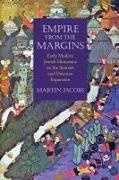Read more
"In 1492, the year that marked the start of Spain's transatlantic expansion, the Spanish monarchs expelled their Jewish subjects and triggered a mass Jewish migration to the lands of the Ottoman empire. But while the rise of these rival empires had tremendous impact on the Jewish population's geography, the historical accounts of contemporary Jews have remained peripheral to the study of early modern imperialism. Here, Martin Jacobs seeks to both understand how the history of empires appears through the lens of marginalized communities and to explore Jewish responses to Spanish and Ottoman imperial expansion. Jacobs approaches this history through the Hebrew chronicles of three sixteenth and seventeenth centuries Jewish authors. Elijah Capsali of Crete, Joseph ha-Kohen of Genoa, and Joseph Sambari of Cairo all lived in early modern hubs with global connections, and - in unusual detail for premodern Jewish historians - they described how the Spanish and Ottoman empires redrew the political, cultural, and religious map of the Mediterranean region while simultaneously transforming the transatlantic world. As Jews, these writers belonged to an ethno-religious minority within the Mediterranean basin where the Spanish and Ottoman empires were centered, and from here they expressed marginalized views on the Spanish and Ottoman regimes. At the same time, these Jewish authors belonged to Jewish networks that transcended imperial boundaries, and they voiced conflicting loyalties between different authorities and cultures. And Jacobs shows that, in writing about the Spanish and Ottoman expansion, these authors also grabbled with the Jews' precarious position in their host societies and their own multilayered identities. Their shifting positionalities illuminate the contending allegiances of a Jewish diaspora living in and between rivaling empires"-- Provided by publisher.
About the author
Martin Jacobs

